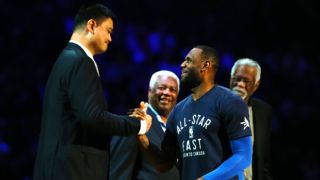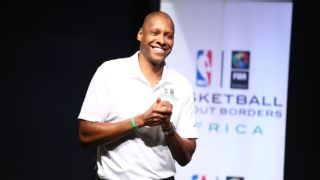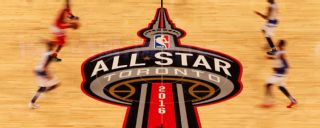TORONTO -- Long after the end of an All-Star Game that featured a record 369 points but little in the way of memorable moments, a boy on his way out of Air Canada Centre looked up at his father and asked, "Is it very easy to be an All-Star two times in a row?"
I wanted to pull him aside and explain that nothing to do with All-Star Weekend is easy. Not the process of reaching the All-Star Game once, let alone in back-to-back years or 18 times. Especially 18 times. That's why Kobe Bryant had not one but two tribute videos playing on the scoreboard screens before the game.
There's nothing easy about becoming an NBA city with a chance to host an All-Star Weekend, as those who were around for the formation of the Toronto Raptors in 1994 can attest. There was nothing easy about getting to Toronto or being here throughout one of the coldest weekends in decades.
But man, the payoffs. Only at All-Star Weekend can you share an elevator with Hall of Fame players, chit-chat with the power brokers of the NBA or bear witness to moments that will be talked about for years.
The basketball itself is easy. Even among the abundant corporate sponsor signage at the NBA Centre Court fanfest, there was something pure about the enjoyment kids found in dribbling and shooting the ball.
But All-Star Weekend really isn't about the game, and it feels that way more than ever.
Let's begin the story on Friday morning at a photo exhibition called Hoop Shots on the 68th floor of the First Canadian building. There's an extraordinary view of Toronto and Lake Ontario beckoning through the windows. The exhibit contains reproductions of old photographs of basketball's founder, Dr. James Naismith, and his original rules of the game. There are pictures depicting legendary clashes, from Bill Russell vs. Wilt Chamberlain to Magic Johnson vs. Larry Bird.
Curator Gail Buckland chose some photos based on their aesthetic quality -- the lighting and symmetry. Others she chose for historic significance. She leads a couple of visitors over to a picture of Kentucky coach Adolph Rupp and his players as they were about to lose the 1966 NCAA championship game to Texas Western, the first time an all-black starting lineup won the tournament. Buckland says that if you look at the expressions on the faces of the Kentucky coaches, players and even cheerleaders, it's apparent that this is more than just the result of a game. It's a moment that America is changing, and everyone in the shot realizes it.
The people working their way through the gallery were gathered for the latest manifestation of that ongoing quest for integration: the drive to diversify NBA front offices. It's an informal breakfast gathering, a chance to network.
Nzinga Shaw has held the newly created position of NBA chief diversity and inclusion officer -- the first of its kind in the NBA -- for a little more than a year. Even her business cards are diverse; she has versions in both the Hawks' home white and red colors and the "Georgia granite gray" of the road jerseys. Each has the "volt green accent."
Cory Nettles, who is one of five African-Americans who formed a group called Partners for Community Impact that bought a share of the Bucks, is there to make the point that the NBA can maintain diversity among its ownership groups among its soaring franchise valuations.
Those goals might seem to be in opposition. With the average team now worth $1.25 billion, according to Forbes, the pool of principal owner candidates has shrunk to members of the enormous wealth generated by the technology, hedge fund and private equity business sectors. It's rare to see prominent African-Americans in those fields.
But teams still have the option to bring in minority (in more ways than one) partners, as the Bucks main ownership tandem of Wesley Edens and Marc Lasry did in Milwaukee.
Edens and Lasry are from New York. Prior owner Herb Kohl would only sell to buyers who intended to keep the team in Milwaukee. But staying in the city would require a new arena to replace the aging Bradley Center. It would require local input to help navigate the political challenges of building a new, half-billion-dollar facility with half of the funding coming from public money.
"If they were going to be successful in Milwaukee, it needed significant community support and engagement, including in the ownership group," Nettles said. "It's not about [diversity] being a secondary priority because they're trying to monetize their economics. They understand that to monetize their economics that diversity is a critical component of that. So it's really not a trade-off. They're not competing objectives anymore.
"Very few of these franchises are singularly owned. They're owned by a group of people. As long as in that ownership group you have a diversity of people and perspectives and experiences represented, I think that creates opportunity for other people to be involved.
"[Lasry and Edens] did not need our money to do the deal. Our money is an inconsequential aspect of the deal. But they understood the value. I agree, as the teams are changing hands and you're looking at the valuations of these teams, you're in real rarefied air and there are not a lot of diverse owners who can come in and buy the majority ownership of the franchise. But they certainly can become a part of the ownership group at whatever level is material to them and can have an outsized influence in the strategy, engagement and direction of the franchise."

Later Friday, Hall of Famers Oscar Robertson and Wayne Embry made their way to the Sheraton Centre Toronto Hotel, where they participated in the announcement of the Hall finalists for 2016. The new group has some big names among the candidates, including Shaquille O'Neal, Allen Iverson and Yao Ming.
At first glance, Yao might not seem worthy of being in the same class as O'Neal and Iverson. After all, O'Neal and Iverson are both among the top 25 scorers in NBA history, while Yao isn't even among the top 250. It's only when you take into consideration Yao's role in growing the game in his native China that you realize why he was on that stage Friday, or why he joined Robertson and Russell on the court during the All-Star Game on Sunday, or why NBA commissioner Adam Silver said Yao is "going to end up probably having as great an impact on this game as anyone who has ever played."
An estimated 300 million people are playing basketball in China. And do you know the primary programming involved in ESPN's mega-deal with Chinese tech company Tencent? NBA basketball. So much of the game's popularity there can be traced to the seven-plus seasons Yao played with the Houston Rockets. And Yao's story in itself is a byproduct of the NBA's international reach under previous commissioner David Stern, starting with showcasing the Dream Team in the Olympics, and including the league's expansion into Canada in the 1990s. Eventually it made its way to Yao in China.
"At an early age, we didn't know much about the outside world ... the States, Hall of Fame, those things," Yao said after the Hall of Fame announcement. "We didn't know that until late '90s. Still, that was almost light-years away from us. And here we are. Here I am today. I just feel that this is not an end, this is the beginning for a new generation."
Of course, light-years was a figurative term. The literal distance was impressive enough: It's about 7,000 miles from Yao's birthplace in Shanghai to Toronto.
"All of the technology makes the world smaller, makes people closer," Yao said. "I think that just happened, not only in sports area -- social culture, and all that stuff. People need to communicate. And the best way, I think, is sports."
All that talk about distance and just a few steps away was Pistons Hall of Famer Isiah Thomas, a key component in the rise of Toronto basketball. It was only a few blocks away from this hotel ballroom that the Raptors went through their gestation period. They had offices in a building on 150 York Street, sharing the 11th floor with a travel agency and the Japanese and Malaysian consulates. They had no players or coaches. They had yet to pick a location or a permanent arena. And they faced a deadline to sell 12,500 season tickets by the end of 1994 or risk having their expansion franchise revoked. (A national drugstore chain bought the remaining tickets -- reportedly more than 4,000 -- to keep the Raptors viable.)
Thomas, then 33, was a part-owner and the team's executive vice president, although his job required so much more than assembling a roster.
"My job was to sell basketball in this country and sell basketball to Toronto," Thomas recalled. "I remember knocking on doors late at night, passing out fliers, talking about the Raptors."
All he had to discuss at first was a logo, that dribbling dinosaur, a trademark Thomas envisioned being as enduring as Ronald McDonald. But he had reason to believe. Half of Toronto's population was born outside of Canada, so hockey wasn't as embedded in everyone's mind as as you might think. Why not make basketball their first love?
"You hoped," Thomas said. "And all you really did was, you looked at the demographics. I knew what basketball was in America, but we didn't have the framework that America has in terms of the high school associations, then NCAA, so you have natural feeder systems in terms of coverage and information. So we really had to do all that here in terms of building the infrastructure. It was really a big haul. There were some nights you didn't know if you were going to make this work. You see where we are today."
Now Toronto is a place where fans pack the streets outside the arena to watch playoff games on a giant screen. With the departure of the Grizzlies from Vancouver to Memphis, the Raptors now represent more than a city or even a region.
"We have all of Canada," Raptors All-Star guard DeMar DeRozan said. "Everywhere we go in Canada, it's 'We the North. We the North.' You've got to appreciate that when you've got something like that going on."

Raptors GM Masai Ujiri leaned against a wall on the second floor of a restaurant and expressed relief. It's Thursday night, the traditional soft launch into All-Star Weekend, and he just held a screening for the movie "Giants of Africa," a documentary built around Ujiri's efforts to bring basketball camps to Nigeria, Ghana, Rwanda and Kenya. His passion and dedication to the project are so evident that it makes you wonder when he has time to run the Raptors. DeRozan went to the screening and thought the same thing. But here, at a post-screening reception, the Raptors occupy Ujiri's thoughts.
He's relieved that they are relevant as the NBA comes to town. They have the second-best record in the Eastern Conference and DeRozan and Kyle Lowry are the first guard tandem All-Stars from the host team since Jerry West and Gail Goodrich in Los Angeles in 1972. He would have hated for a subplot of the weekend to be "What's wrong with the Raptors?" stories. Those worries are gone.
But the movie makes it clear that while the Raptors are his job, the African basketball camps are his calling. He has been inspired by Nelson Mandela himself, whom he met during an NBA trip to South Africa. Ujiri, who grew up in Nigeria, feels obligated to do whatever he can to elevate his home continent.
The other thing that's evident? Ujiri, whose professional playing career consisted of stints with club teams in Europe, is an All-Star. Not in the participation-trophy-everyone-is-a-winner sense. In the grand scheme of things. He came from Africa to land one of only 30 general manager jobs in the NBA. It's the type of journey he wants to inspire other African children to duplicate.
His advice to them could also serve as an answer the kid at the All-Star Game on Sunday night. It's not easy. Great accomplishments never are.


